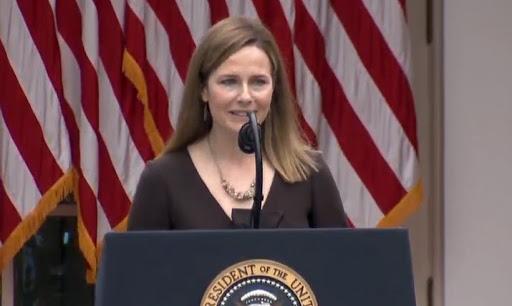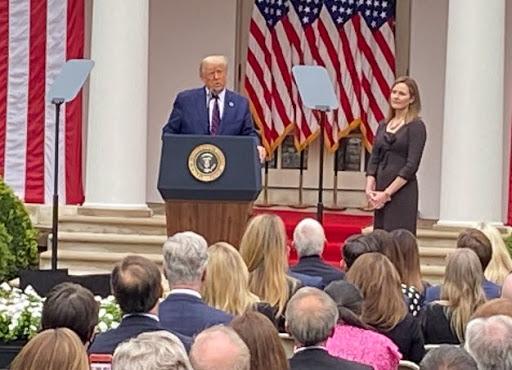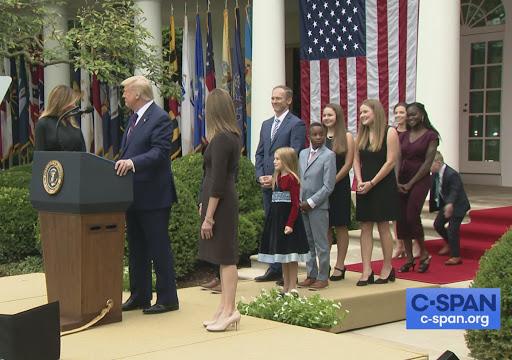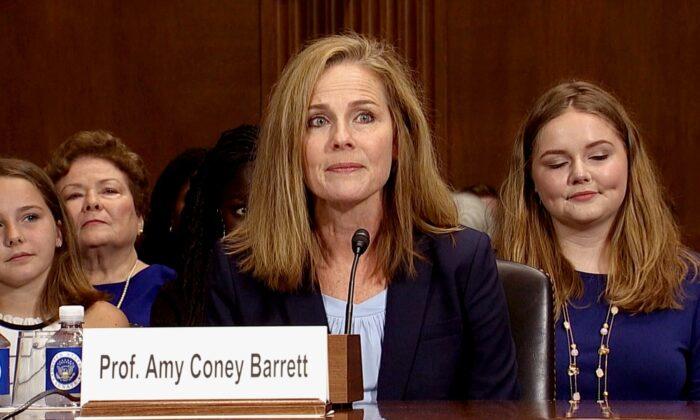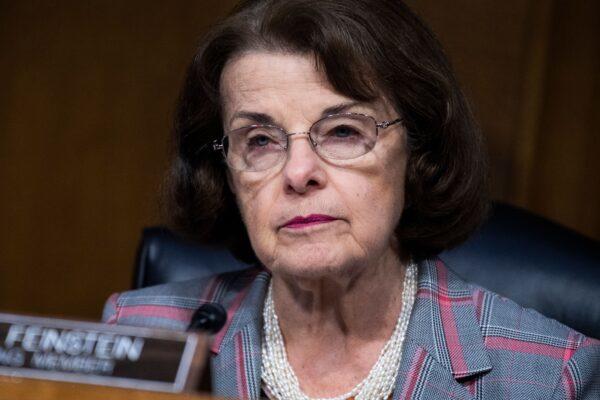Amy Coney Barrett Picked By Trump As U.S. Supreme Court Nominee
Tyler Durden
Sun, 09/27/2020 – 04:50
President Trump is set to announce his nominee for the Supreme Court seat left vacant by Justice Ruth Bader Ginsburg’s death last week. And, as previously reported, Trump has picked Amy Coney Barrett.
Barrett was considered a finalist for the Supreme Court vacancy left by the retirement of Justice Anthony Kennedy in 2018, but Justice Brett Kavanaugh was tapped by the president instead. Due to her religious beliefs, Barrett is feared by liberals even though some concede that she has “a topnotch legal mind.”
Barrett, known to be a devout Catholic who considers abortion “always immoral,” would fill the seat vacated by the death of Justice Ruth Bader Ginsburg. The loss of liberal icon Ginsburg and the confirmation of the conservative Barrett, 48, could cement the Supreme Court’s rightward shift for a generation.
While Joe Biden has said the winner of the presidential contest should fill Ginsburg’s seat, there’s little Democrats can do to delay a vote on Barrett, a former clerk for the late Justice Antonin Scalia, the high court’s former conservative standard-bearer. Needless to say, her appointment will play a dominant role in the final weeks of the presidential election.
Senate Majority Leader Mitch McConnell (R-Ky.) said after Ginsburg’s death on Sept. 18 that a vote will be held on the Senate floor for Trump’s nominee.
McConnell has not said yet whether the vote will take place before or after the Nov. 3 election. In a statement moments after the nomination, McConnell said that “Judge Amy Coney Barrett is an exceptionally impressive jurist and an exceedingly well-qualified nominee to the Supreme Court. A brilliant scholar. An exemplary judge. President Trump could not have made a better decision.”
Judge Amy Coney Barrett is an exceptionally impressive jurist and an exceedingly well-qualified nominee to the Supreme Court.
A brilliant scholar. An exemplary judge. President Trump could not have made a better decision. pic.twitter.com/FKadx6TJeU
— Leader McConnell (@senatemajldr) September 26, 2020
The Senate Judiciary Committee must hold confirmation hearings with the nominee ahead of the confirmation vote by the full Senate. Although senators typically go home to campaign for reelection in October, members of the Judiciary Committee may have to remain in Washington for any hearings ahead of the election.
Late Friday, amid multiple media outlets, all citing anonymous sources, reporting that Trump was planning to nominate Barrett, Sen. John Cornyn (R-Texas) announced that the Senate was going to “begin a thorough review of Judge Barrett’s nomination.”
“I look forward to meeting with her in the coming days as the Judiciary Committee prepares for her confirmation hearing,” Cornyn announced.
This is the third justice nominated by Trump appointed to the Supreme Court. If appointed, Barrett would also expand the conservative majority on the court, widening it to 6 to 3.
Watch Live (Trump Address due to start at 5pmET):
* * *
So, who is Amy Coney Barrett?
The Epoch Times’ Mimi Nguyen Ly explains Barrett, 48, who currently serves on the Chicago-based 7th Circuit Court of Appeals, earned her J.D. at Notre Dame Law School in 1997. She served as a clerk in 1997-1998 for Judge Laurence Silberman of the D.C. Circuit Court of Appeals and later as a clerk in 1998-1999 for the late Justice Antonin Scalia, who died in 2016.
After her clerkships, she was an associate at law firm Miller, Cassidy, Larroca & Lewin in Washington, D.C. for a year, and later moved to Texas-based firm Baker Botts in 2000, before leaving for academia.
In 2002, she became a professor at Notre Dame Law School, where she taught constitutional law, the federal courts, and statutory interpretation. She was named “distinguished professor of the year” three times, according to SCOTUSblog.
Barrett was appointed by Trump and confirmed by the Senate 55-43 to the 7th Circuit Court of Appeals in 2017. At the time, every full-time member of Notre Dame Law School’s faculty signed a strong letter of support (pdf) for her nomination, as did every law clerk who served a U.S. Supreme Court justice during the term that Barrett clerked for Scalia (pdf).
Barrett is a Roman Catholic. At her confirmation hearing, Democrats on the Senate Judiciary Committee questioned her over her Catholic faith in fulfilling the judicial role.
“The dogma lives loudly within you,” Sen. Dianne Feinstein (D-Calif.) said.
“And that’s of concern when you come to big issues that large numbers of people have fought for years in this country.”
Feinstein also indicated that she was worried that Barrett may ignore Supreme Court precedents on issues such as abortion.
Barrett said she would respect Supreme Court precedent.
When asked about the article, Barrett said, “It’s never appropriate for a judge to impose that judge’s personal convictions, whether they arise from faith or anywhere else, on the law.” She also said later at the hearing that her views on abortion “or any other question will have no bearing on the discharge of my duties as a judge.”
Finally, as we previously pointed out, Alan Dershowitz notes under our Constitution, Senator Feinstein’s statement crossed the line. Ours was the first Constitution in history to provide that “no religious Test shall ever be required as a Qualification to any Office or public Trust under the United States.”
Although Feinstein did not explicitly impose a religious test, she suggested that personal religious views — which she called dogma — might disqualify a nominee from being confirmed.
That would clearly be unconstitutional.
Sen. Dianne Feinstein (D-Calif.) attends a Senate Judiciary Committee hearing on Capitol Hill in Washington on June 16, 2020. (Tom Williams/Pool/AFP via Getty Images)
A number of past cases and writings provide insight into Barrett’s stance on various issues, from the death penalty, to immigration, and gun rights.
For example, Barrett was questioned at her 7th Circuit confirmation hearing about an article she co-wrote in 1998, titled “Catholic Judges in Capital Cases.” The article discussed Catholics’ moral and legal obligations when asked to rule in a death penalty case. It stated, “The prohibitions against abortion and euthanasia (properly defined) are absolute; those against war and capital punishment are not.”
“There are two evident differences between the cases. First, abortion and euthanasia take away innocent life. This is not always so with war and punishment,” read the article, which Barrett wrote with former Notre Dame law professor John H. Garvey, who now is the president of the Catholic University of America in Washington, D.C.
“If one cannot in conscience affirm a death sentence the proper response is to recuse oneself,” the law review article also said.
“Catholic judges must answer some complex moral and legal questions in deciding whether to sit in death penalty cases. Sometimes (as with direct appeals of death sentences) the right answers are not obvious. But in a system that effectively leaves the decision up to the judge, these are questions that responsible Catholics must consider seriously,” the article concluded. “Judges cannot—nor should they try to—align our legal system with the Church’s moral teaching whenever the two diverge. They should, however, conform their own behavior to the Church’s standard. Perhaps their good example will have some effect.”
Barrett and her husband have seven children, two of whom are adopted from Haiti. Her husband, Jesse Barrett, serves as an assistant U.S. attorney for the Northern District of Indiana.
If Barrett is confirmed, she would join Trump appointees Gorsuch and Kavanaugh to form a 6-3 majority in the Supreme Court of justices who were appointed by Republican presidents.
Barring some unforeseen disaster, there appears little Democrats can do – despite the threats – to delay a vote on Barrett, solidifying a right-leaning shift to the court for a generation.
